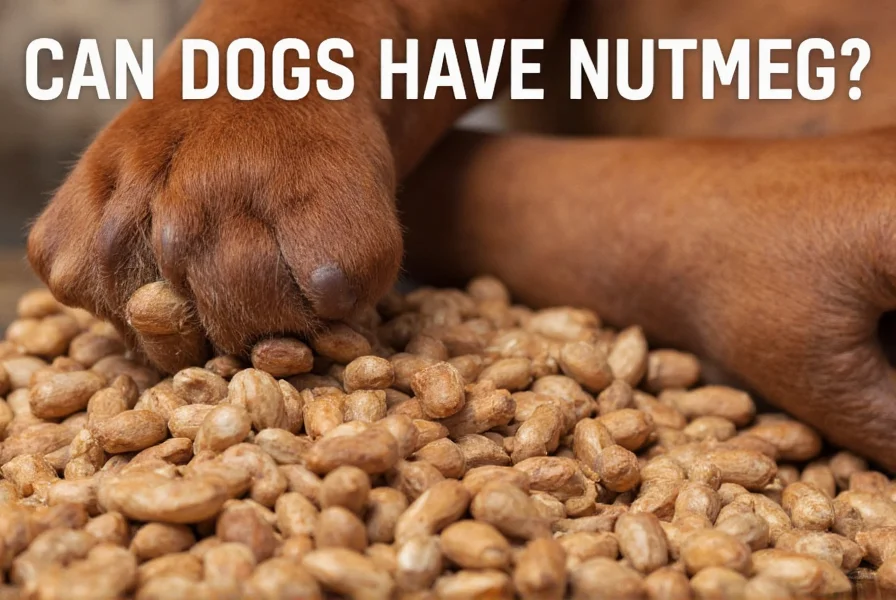Nutmeg might be a common kitchen spice for human cooking, but it poses significant dangers to our canine companions. Understanding the risks associated with nutmeg consumption in dogs is crucial for pet owners who want to keep their furry friends safe from accidental poisoning.
Why Nutmeg Is Dangerous for Dogs
Nutmeg contains a compound called myristicin, which is toxic to dogs even in small amounts. Myristicin affects the dog's nervous system and can lead to hallucinations, disorientation, and other neurological symptoms. While humans can metabolize myristicin relatively safely, dogs process it much more slowly, allowing the toxin to build up to dangerous levels in their system.
According to veterinary toxicology studies, as little as 2.5 grams of nutmeg (approximately half a teaspoon) can cause toxicity symptoms in a medium-sized dog. Larger amounts increase the risk of severe complications including increased heart rate, high blood pressure, and potentially life-threatening conditions.

Symptoms of Nutmeg Poisoning in Dogs
If your dog has consumed nutmeg, watch for these symptoms which may appear within 1-6 hours after ingestion:
- Excessive thirst and urination
- Vomiting and diarrhea
- Abdominal pain
- Disorientation and confusion
- Tremors or seizures
- Elevated heart rate
- High body temperature
- Depression or lethargy
Severe cases of nutmeg toxicity can lead to more dangerous symptoms including hallucinations, seizures that last longer than five minutes, and in extreme cases, organ failure. The severity of symptoms typically correlates with the amount consumed relative to the dog's size.
How Much Nutmeg Is Dangerous for Dogs
| Dog Size | Dangerous Amount | Potential Symptoms |
|---|---|---|
| Small dogs (<20 lbs) | 0.5-1 gram (⅛-¼ tsp) | Mild symptoms: vomiting, diarrhea, lethargy |
| Medium dogs (20-50 lbs) | 1-3 grams (¼-½ tsp) | Moderate symptoms: tremors, disorientation, increased heart rate |
| Large dogs (>50 lbs) | 3-5 grams (½-1 tsp) | Severe symptoms: seizures, high fever, potential organ damage |
It's important to note that individual dogs may react differently to nutmeg exposure. Some dogs might show symptoms after consuming smaller amounts, while others might tolerate slightly larger quantities. However, there is no safe amount of nutmeg for dogs, and any consumption should be taken seriously.
What to Do If Your Dog Ate Nutmeg
If you suspect your dog has consumed nutmeg, follow these steps:
- Stay calm - Panicking won't help your dog
- Determine how much was consumed - Check packaging or estimate the amount
- Contact your veterinarian immediately - Provide details about your dog's size and the estimated amount consumed
- Do not induce vomiting unless specifically instructed by a veterinary professional
- Monitor your dog closely for any symptoms while waiting for veterinary advice
In emergency situations where your regular veterinarian is unavailable, contact an animal poison control center. The ASPCA Animal Poison Control Center (888-426-4435) and Pet Poison Helpline (855-764-7661) are available 24/7 for pet poisoning emergencies.
Other Spices That Are Dangerous for Dogs
Nutmeg isn't the only common kitchen spice that poses risks to dogs. Pet owners should also be cautious with:
- Onion powder and garlic powder - Can cause hemolytic anemia
- Cinnamon - Can cause breathing problems and low blood sugar
- Nutmeg alternatives like mace - Contains similar toxic compounds
- Hot spices (cayenne, chili powder) - Can cause gastrointestinal distress
When preparing homemade dog treats, stick to dog-safe ingredients and avoid using human spice blends, which often contain multiple potentially harmful ingredients.
Safe Flavor Alternatives for Dogs
If you're looking to add flavor to your dog's food or homemade treats, consider these safe alternatives:
- Pumpkin puree (not pumpkin pie filling)
- Unsweetened applesauce
- Plain yogurt
- Small amounts of peanut butter (xylitol-free)
- Cooked sweet potato
- Blueberries or other dog-safe fruits
Always introduce new foods gradually and in moderation to avoid digestive upset. When in doubt about any ingredient, consult with your veterinarian before offering it to your dog.
Preventing Nutmeg Exposure in Dogs
Prevention is always better than treatment when it comes to pet safety. Here are some practical tips to keep your dog safe from nutmeg and other dangerous spices:
- Store spices securely in closed cabinets out of your dog's reach
- Be cautious when cooking with nutmeg - keep dogs out of the kitchen
- Avoid using nutmeg in recipes when dogs are present
- Don't leave baked goods containing nutmeg unattended where dogs can access them
- Educate family members and visitors about the dangers of nutmeg for dogs
- Read labels carefully on pre-made foods and treats
When to Seek Immediate Veterinary Care
Contact your veterinarian immediately if your dog has consumed nutmeg, especially if:
- Your dog shows any symptoms of toxicity
- The amount consumed exceeds 0.5 grams for small dogs or 1 gram for larger dogs
- Your dog has underlying health conditions
- You're unsure how much was consumed
Early intervention significantly improves the prognosis for dogs who have ingested toxic substances. Don't wait for symptoms to appear before seeking veterinary advice.
Final Thoughts on Nutmeg and Dogs
While nutmeg might enhance our holiday baking, it has no place in a dog's diet. The risks associated with nutmeg consumption in dogs far outweigh any potential benefits. As responsible pet owners, we must be vigilant about keeping potentially toxic substances away from our canine companions.
Remember that dogs have different metabolisms than humans, and many foods that are safe for us can be dangerous for them. When it comes to your dog's diet, when in doubt, leave it out - and always consult with your veterinarian about any concerns regarding your pet's health and nutrition.
Is a small amount of nutmeg dangerous for dogs?
Yes, even small amounts of nutmeg can be dangerous for dogs. As little as 0.5 grams (about ⅛ teaspoon) can cause symptoms in small dogs. There is no safe amount of nutmeg for dogs, and any consumption should be taken seriously. Contact your veterinarian if your dog has consumed any amount of nutmeg.
How long after eating nutmeg do dogs show symptoms?
Symptoms of nutmeg toxicity typically appear within 1-6 hours after ingestion, though they may take up to 12 hours to manifest. Early signs include vomiting, diarrhea, and lethargy, while more severe neurological symptoms like tremors and disorientation may develop later. Monitor your dog closely for at least 24 hours after suspected exposure.
Can dogs recover from nutmeg poisoning?
Yes, most dogs can recover from nutmeg poisoning with prompt veterinary care. Recovery time varies depending on the amount consumed and how quickly treatment begins. Mild cases may resolve within 24-48 hours with supportive care, while severe cases requiring hospitalization might take several days to a week for full recovery. Early intervention significantly improves the prognosis.
What should I do if my dog ate pumpkin pie with nutmeg?
Pumpkin pie often contains nutmeg along with other potentially harmful ingredients like sugar, spices, and sometimes xylitol. Contact your veterinarian immediately and provide details about how much pie your dog consumed. The vet will determine if intervention is needed based on your dog's size and the estimated amount of nutmeg ingested. Do not induce vomiting unless specifically instructed by a veterinary professional.
Are there any safe spices I can give my dog?
Some spices are generally considered safe for dogs in small amounts, including turmeric (which has anti-inflammatory properties), cinnamon in very small quantities, and small amounts of ginger. However, it's always best to consult with your veterinarian before introducing any new spices to your dog's diet. For flavoring dog treats, safer alternatives include pumpkin puree, unsweetened applesauce, or small amounts of xylitol-free peanut butter.











 浙公网安备
33010002000092号
浙公网安备
33010002000092号 浙B2-20120091-4
浙B2-20120091-4